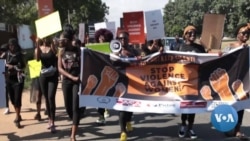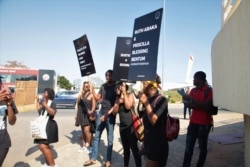Dozens of women have marched in the capital of Ghana to protest impunity surrounding attacks on women and girls in the West African country. The activists added their voices to the global conversation on justice for victims of sexual abuse, and holding abusers accountable.
Protesters marching through Accra - a sign that Ghana's #MeToo movement is gaining strength here. Victims of domestic and sexual violence are publicly naming abusers, while authorities are being criticized for not making the safety of Ghana’s women and girls a priority.
Protest organizer Eugenia Baffour Bankoh said Saturday’s march was intended in part to draw attention to a recent case of four young women who were kidnapped and murdered in the Western Region of Ghana. Police have been widely accused of mismanaging the investigation.
“The average Ghanaian woman is still living the reality every day of living with their abusers, having to face the police or the justice system not supporting them at all, their community shaming them, everybody around. If it's not the slut-shaming, it's the system - the patriarchal system alone does not support the women, especially for victims. So we still have a long way to go but I think all it takes is one step. That is why we are going to the field,” Bankoh said.
As they marched through the streets protesters were dressed in black and held placards that called for an end to rape and domestic violence. Some held placards bearing the names of victims. Passersby stopped to watch the procession, some cars honking their horns in support.
The march was promoted over social media, the central medium for the global MeToo movement.
Protester Pokuaa Adu hoped those watching the march would be inspired to take part in the future.
"I am joining the march today to fight against violence against women. I think it's so important, women are half the population in Ghana and yet we are targeted constantly,” Adu said.
This is a sentiment shared by Ghanaian radio broadcaster, activist and feminist, Felicity Nana Nelson. She uses her work on the radio, as well as her large social media following, to hold perpetrators to account and advocate for the rights of women. She is one of a few strong female voices on breakfast radio in Ghana.
“I'm putting gender on the agenda. That is the whole point. When an issue comes up it's like okay, what is the women's side of this, how are women being affected by this issue? So I try to bring that to the fore,” Nelson said.
The protest ended with a candle-lit vigil for all victims of sexual and domestic violence, and to show solidarity with the worldwide MeToo movement.







